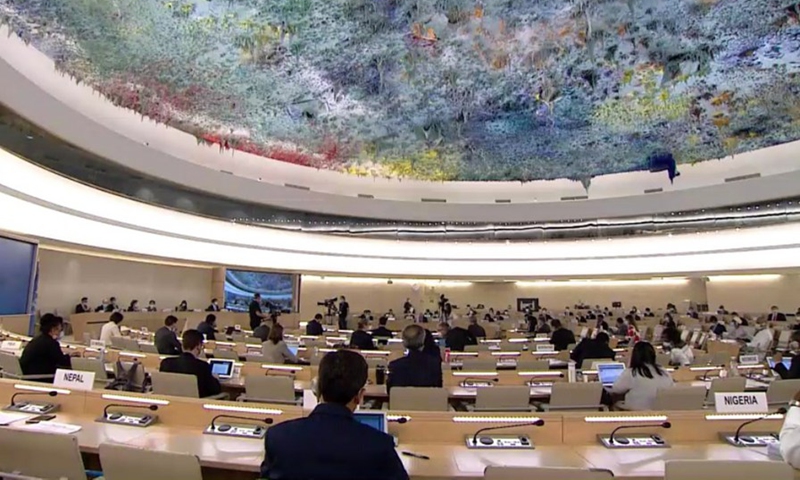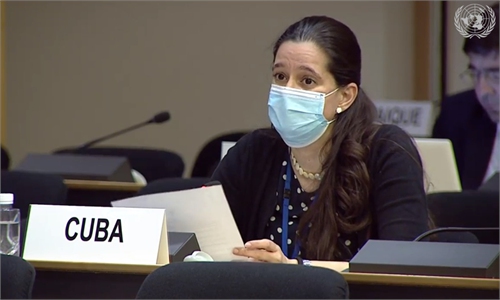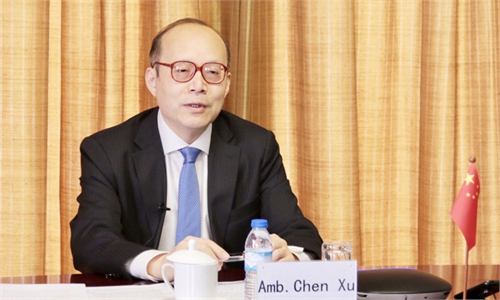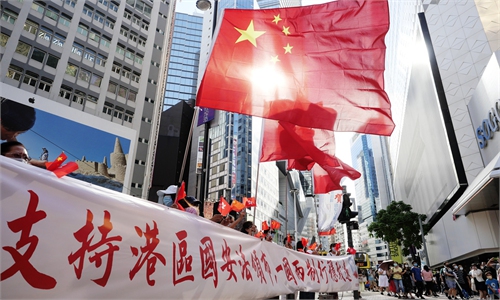China’s UNHRC entry reflects international recognition
US record on racism makes it unqualified to ‘point finger at election result’

Video image shows a session of the UN Human Rights Council held in Geneva, Switzerland. Photo: Xinhua
China's entry into the United Nations Human Rights Council (UNHRC) reflects the international community's recognition of China's human rights progress, and some Western countries should stop politicizing human rights issues, observers said, noting that the US, which has withdrawn from the council, is not qualified to point a finger at the election result, especially considering its record on racism and police violence.
On Tuesday, China was elected to the UNHRC for the term 2021-2023. China's Permanent Mission to the UN released a statement to express gratitude to member states for their support, and congratulated other elected members.
China will take this opportunity to continue to firmly uphold multilateralism, to promote international exchanges and cooperation on human rights, and oppose the politicization of human rights issues and wrong practices of double standards, the statement said.
China had served as member of the Human Rights Council four times. It vied with four other countries - Pakistan, Nepal, Uzbekistan and Saudi Arabia--for four seats in the contest for the Asia-Pacific region.
Fifteen members to the 47-member Human Rights Council were decided in advance because the other regional groups had uncontested slates.
Some Western politicians continued their criticism, claiming that the entry of China, Russia and Cuba in the Human Rights Council suggests that the current system of entry to the council is in serious need of reform.
"The election shows the international community's recognition of China. Since 2006, the UNHRC has made efforts to ensure the fairness of the election procedure, and also has a mechanism to disqualify a member with human rights stains. Elected members have been chosen in accordance with UN regulations and related procedures," Liu Xinsheng, a member of the UN Human Rights Council Advisory Committee and former Chinese ambassador to Cyprus, told the Global Times.
He noted that since the end of the Cold War, some Western countries have long been using human rights issues to attack developing countries and countries that are "different" from them. It is also unfair and wrong for certain forces to accuse the UNHRC and its procedures, just because the result did not fit their expectations.
Recent rumors and accusations of China "violating" human rights in its Xinjiang Uygur Autonomous Region, Tibet Autonomous Region and Hong Kong Special Administrative Region may fool some people in the international community. But more people would get the truth of these regions and fairly judge China's efforts to protect human rights, Zhu Ying, deputy director of the National Human Rights Education and Training Base of Southwest University of Political Science and Law, told the Global Times.
US Secretary of State Mike Pompeo also tweeted after the vote, claiming that the election of China, Russia and Cuba to the UNHRC "validates the US decision to withdraw from the council in 2018."
In response, Chinese Foreign Ministry spokesperson Zhao Lijian said at a press briefing on Wednesday that Pompeo's remarks are "very ridiculous," and that the US is not qualified to point a finger at the UNHRC, as it withdrew and has stood opposite the international community.
"We urge the US to stop spreading political virus and make concrete efforts to protect Americans' rights, eliminate racism, police violence and other violations of human rights. We also urge the US to safeguard Americans' right to life and health amid the COVID-19, and stop using human rights as an excuse to interfere with other countries' domestic affairs," Zhao said.
The US announced its withdrawal from the council on June 19, 2018. Since then, it has started a quest to build a human rights system to attack countries that have been deemed "enemies" of the US, and to serve US interests, observers said.
In a videotaped address during a US-hosted event at the UN General Assembly in September, Pompeo outlined his campaign to redefine and prioritize human rights in a speech billed as "Promoting and Protecting Human Rights: A Re-Dedication to the Universal Declaration of Human Rights."
An anonymous expert familiar with UN related affairs told the Global Times that what the US has done goes against what the Universal Declaration of Human Rights promotes—namely, multilateralism, cooperation, openness and diversity.
What the US wants is to adapt the current international human rights system into a new one more suitable to serve US interests, to help the US gain more support when it wants to use human rights as an excuse to pressure its strategic rivals, experts said. However, the world has changed. The US has lost its moral high ground and has been haunted by human rights stains like racism, police violence and the mistreatment of Muslims.




